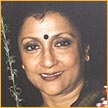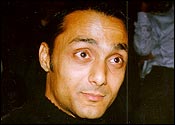
|
Aparna Sen makes a statement
again
The Bengali director's Mr and Mrs
Iyer is off to Locarno film festival this year
|
Two decades after her
masterpiece, 36 Chowringhee Lane,
undoubtedly one of the top ten Indian films, Aparna
Sen is back with her second English film,
Mr and Mrs Iyer.
A love story between a Bengali wildlife
photographer and a married Tamilian Brahmin woman, set in the
backdrop of fundamentalism and violence, the film stars Rahul Bose
and Konkona (Sen's daughter).
The film ran into some problems with environmentalists while they
were shooting in North Bengal, but it appears that all issues have
been resolved.
The film has been chosen as the official selection at the Locarno
film festival this year, of which actor Aamir Khan is a jury
member.
Deepali Nandwani met Sen to talk about her
film:
What prompted you to make a film set amidst the backdrop of
violence?
Actually, it is not only about violence and fundamentalism. That
is just a strain running through the film. It is actually about a
journey of two people --- a Tamilian Brahmin woman Meenakshi Iyer,
and a Bengali man, Raja Choudhury. It is about what happens when
two people are thrown together in unforeseen circumstances, amidst
something as destructive as a riot.
It is about how relationships grow and are nurtured when people
are forced to be together on a journey. It leaves them both
richer. In a sense, it is a road movie. About three-fourths of it
happens with the passengers travelling in a bus --- from the hilly
terrain of some indeterminate place in India down to the plains.
I kept the geographical setting undefined and unstated because it
is a journey that could take place anywhere.
How important is the backdrop of violence in the film?
The violence brings a little poignancy to the story. Fear and
uncertainty brings the people together. Some of the timeless love
stories --- English Patient, Dr Zhivago --- were set in the backdrop
of violence. The film is set some time after the attacks on the
Indian Parliament December 13, 2001.
I have been deeply concerned about the ugly head of fundamentalism
that has been ravaging the country continuously. Violence once had
no place in Indian society or its thought process. I have
expressed this concern time and again in my editorials in Sananda, the Kolkata woman's fortnightly
that I edit.
It pains me to see that the secularism that Jawaharlal Nehru and
Mahatma Gandhi stood up for is almost extinct. Even among the
urban middle class and the upper middle class, the so-called
educated, enlightened class, secularism is absent.
Why did you choose English as your narrative?
That is because the film deals with characters from diverse
backgrounds. While Raja Choudhary is a Bengali, Meenakshi Iyer is
a Tamilian Brahmin. Obviously, she cannot speak Bengali. Even the
other characters in the film come from different regions of India
--- they represent the country's several parts and cultures. Like
there is a Muslim couple, a Jew, even two Sikhs.
Don't we tend to speak to people from our community in our
language, but with people from other communities in English?
English is the medium of communication for people all over India.
I am also trying to reach the urban, young, English-speaking
audience both in India and abroad.
What do you think of the spate of English films being made by
Indian directors?
I think it is a positive trend, since they reach an audience that
is beyond one particular group. But I also believe that a film
should be made in English only if the subject deserves it, if it
is a universal subject and if it talks to people beyond a certain
region.
How did you decide the cast for the film?
 I had seen Rahul Bose's work in English
August and Split Wide
Open. He is a good actor, very controlled and
intelligent. I made him go through a costume and makeup test, and
felt he would be perfect for Raja Choudhary.
I had seen Rahul Bose's work in English
August and Split Wide
Open. He is a good actor, very controlled and
intelligent. I made him go through a costume and makeup test, and
felt he would be perfect for Raja Choudhary.
My daughter Konkona plays Mrs Iyer. I think she is a very
sensitive actress. She puts in a lot of research into her work.
She worked quite a lot to portray the character of Meenakshi, a
postgraduate in Physics.
The rest of the cast include Bhisham Sahni and Surekha Sikri, who
play a Muslim couple. Bharat Kaul plays an officer of the Rapid
Action Force.
Was there anything you had to keep in mind while making the
film?
I had to make sure that my characters spoke in English with their
regional accent. I sent Konkona to Chennai for a week to learn the
nuances of the Iyers --- not only the way the speak, their
expressions, the way they drape their saris, their attitude to
life, their culture and the way they fit, too.
Your cinematographer Gautam Ghose has worked as cameraman for
one film, his own documentary. Why did you choose him as cameraman
for your film?
He is not only a close friend of mine, he is also one of the best
cinematographers I know. We have a lot in common, like our passion
for filmmaking and our attitude towards life. I knew he would do
justice to the film.
Among all your films, which do you consider your best?
Yuganto, which dealt with subjects
like ambition, ecology, politics and relationships. It was about
how success makes us compromise.
In terms of making a difference, it was Paroma, which dealt with an extra-marital
relationship. It shocked the Bengali society, which is not yet
ready to accept a woman's right to sexual freedom. It instigated a
debate, made a statement.
Are you satisfied with the way Bengali cinema has evolved over
the past few decades?
Mainstream Bengali cinema unashamedly tries to copy Bollywood.
They forget that they don't have the kind of budgets that Hindi
filmmakers have. With the kind of money Bollywood directors have,
they can at least add drama, gloss and glamour to their films,
even if the stories are uninspiring and run-of-the-mill.
Without the huge budgets, mainstream Bengali cinema falls flat on
its face. What I am happy about, though, is the rise of realistic
cinema. There is an audience for realistic cinema now in West
Bengal. Gautam's Dekha, Rituparno
Ghosh's Utsab and my Paromitar Ek Din did very well in Bengal,
which is a good trend.
India News Feature Service